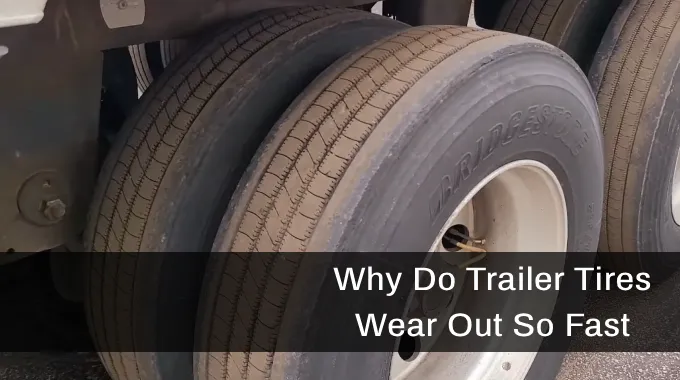Last Updated on July 26, 2023
Do you ever feel like you’re on a never-ending cycle of replacing your trailer tires? It’s almost as if they wear out faster than you can say ‘road trip.’ So why do trailer tires wear out so fast?
One possible reason is inadequate tire maintenance, such as not rotating or balancing them regularly. Overloading the trailer beyond its weight capacity puts excessive strain on the tires, causing them to wear out quickly.
Another factor is incorrect tire pressure, which can lead to uneven wear and premature tire failure. Low-quality tire construction and excessive heat buildup from constant use can also contribute to fast tire wear.
Here we will delve deep into the world of trailer tires and explore the reasons behind their premature demise. So, buckle up and get ready to discover the secrets that lie beneath the surface of your worn-out tires.
Reasons Why Trailer Tires Wear Out So Fast and What to Do About It
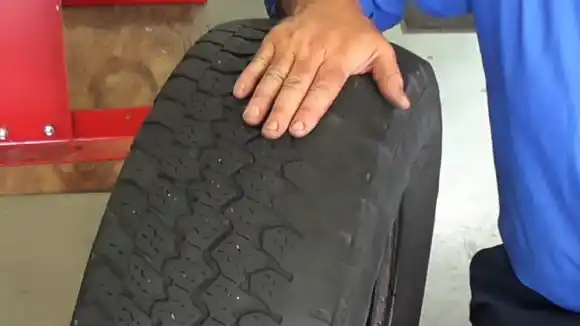
If you’re wondering why your trailer tires wear out so fast, there are several factors to consider:
- Inadequate Tire Tread
- Overloading the Trailer
- Incorrect Tire Pressure
- Low-Quality Tire Construction
- Excessive Heat Buildup
- Poor Road Conditions
- Lack of Tire Rotation
- Improper Alignment Issues
- Irregular Tire Degradation
- Inadequate Tire Maintenance
- Putting Chains on Trailer Tires
Let’s discuss these causes in detail:
No 01: Inadequate Tire Tread
If you’ve noticed irregular wear on your trailer tires, one possible cause could be inadequate tire tread. The tread depth is crucial in maintaining traction and stability on the road. When the tread depth is insufficient, the tire’s grip on the surface decreases, leading to accelerated wear.
This can be particularly problematic for trailer tires, as they often carry heavy loads and are subject to constant friction and pressure. Inadequate tire tread can result from various factors, such as overloading, underinflation, or improper tire rotation.
To prevent this issue, it’s essential to regularly inspect the tread depth of your trailer tires and replace them when necessary.
No 02: Overloading the Trailer
To ensure a smooth and safe journey, don’t overload your trailer. Overloading the trailer can cause excessive wear and tear on the tires, leading to premature tire failure.
When the trailer is carrying more weight than it is designed to handle, the tires bear the brunt of the additional load. This stresses the tires, causing them to wear out faster.
When a trailer is overloaded, the tires are subjected to increased pressure and friction. This can result in overheating, which weakens the tire structure and leads to accelerated wear.
Additionally, an overloaded trailer can cause the tires to wear unevenly, as different parts of the tire may be carrying more weight than others.
To prevent overloading, it is important to carefully consider the weight capacity of your trailer and distribute the load evenly. Regularly check the weight of your cargo and ensure it doesn’t exceed the recommended limit.
No 03: Incorrect Tire Pressure
Maintaining the correct tire pressure is crucial for a smooth and safe journey, as it helps to prevent unnecessary wear and tear on your trailer’s tires.
When the tire pressure is too low, the tire’s sidewalls are forced to flex excessively, leading to heat build-up and deformation. This causes the tire to wear out faster and increases the risk of a blowout.
On the other hand, if the tire pressure is too high, the tire’s contact patch reduces, resulting in uneven wear and reduced traction. It’s essential to consult your trailer’s manual or the tire manufacturer’s recommendations to determine the correct tire pressure. Regularly check the pressure using a reliable gauge and adjust it accordingly.
No 04: Low-Quality Tire Construction
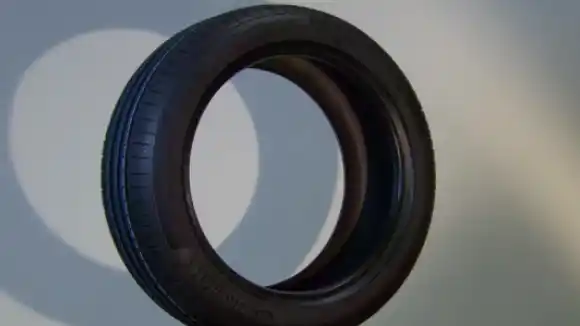
Beware of cheaply made tires that can jeopardize your safety on the road. Regarding trailer tires, low-quality tire construction is a major factor in their fast wear-out rate. These subpar tires are often made with inferior materials and need proper reinforcement, leading to premature tire failure.
Here are some reasons why low-quality tire construction contributes to rapid wear:
- Weak sidewalls: Inferior tires have weak sidewalls that are prone to flexing and bending, causing excessive heat buildup and accelerated wear.
- Flimsy tread compound: Cheap tires often use low-quality tread compounds that wear down quickly, reducing traction and increasing rolling resistance.
- Insufficient reinforcement: Inadequate reinforcement in the tire construction leads to tire distortion, uneven wear, and reduced overall durability.
- Poor adhesion: Low-quality tires may have subpar bonding between the tread and the tire carcass, resulting in tread separation and increased wear.
No 05: Excessive Heat Buildup
Excessive heat buildup in low-quality trailer tires can be likened to a raging inferno, compromising their performance and leading to premature failure.
When a trailer is in motion, the tires generate heat due to the friction between the road and the rubber. However, low-quality tires lack the necessary heat resistance properties, causing them to rapidly accumulate heat.
As the temperature rises, the tire’s internal components, such as rubber compounds and steel belts, begin to degrade. This degradation weakens the tire’s structure, making it prone to blowouts, tread separation, and sidewall damage. Moreover, the excessive heat can cause the tire’s air pressure to increase, further exacerbating the risk of failure.
To combat this issue, investing in high-quality trailer tires specifically designed to withstand the heat produced during towing is crucial, ensuring a longer lifespan and safer journeys is crucial.
No 06: Poor Road Conditions
Navigating rough and dilapidated roads can wreak havoc on subpar trailer tires, jeopardizing their performance and leading to premature failure. Here are four key factors that contribute to the accelerated wear and tear of trailer tires under poor road conditions:
- Potholes: These road hazards can cause significant damage to trailer tires. The sudden impact and compression forces exerted on the tires can result in sidewall bulges, tread separations, and even blowouts.
- Rough surfaces: Rough roads with uneven surfaces generate excessive friction and vibration. This constant abrasion gradually wears down the tire’s tread, reducing its overall grip and compromising its ability to maintain traction.
- Debris: Poor road conditions often mean an increased presence of debris such as rocks, glass, and nails. These foreign objects can puncture the tire, leading to leaks and ultimately tire failure.
- Lack of maintenance: Trailer tires subjected to poor road conditions require regular inspections and maintenance. Failure to properly monitor and address issues like low tire pressure, improper alignment, or uneven wear can further accelerate tire degradation.
To ensure the longevity and performance of trailer tires, it’s crucial to invest in high-quality, durable tires and exercise caution when navigating poor road conditions.
Regular inspections and proactive maintenance are essential to identify and address any potential issues before they escalate and result in premature tire failure.
No 07: Lack of Tire Rotation
One key factor contributing to the accelerated deterioration of trailer tires is the lack of regular rotation. When you fail to rotate your trailer tires, the wear patterns become uneven and concentrated on certain areas. This increases friction and stress on those specific areas, causing them to wear out faster than the rest of the tire.
Additionally, the tires cannot distribute the load evenly without regular rotation, which further exacerbates the problem. As a result, the tread depth decreases unevenly, reducing traction and increasing the risk of tire failure.
Regular tire rotation is essential to ensure even wear and prolong the lifespan of your trailer tires. Following the manufacturer’s guidelines for rotation intervals and patterns is recommended to maximize tire performance and longevity.
No 08: Improper Alignment Issues
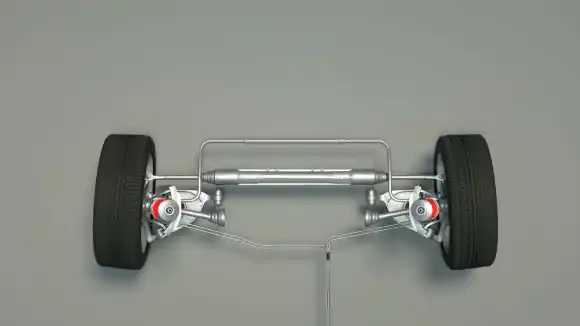
You’ll be amazed at how much smoother and safer your trailer rides when you address improper alignment issues.
Trailer tires wear out quickly when not aligned properly, leading to uneven tire wear and reduced lifespan. Improper alignment can cause the trailer to pull to one side or create a wobbling sensation, making it difficult to control.
To understand the impact of improper alignment, consider the following:
- Tire wear: Misalignment can cause tires to wear unevenly, with certain areas experiencing excessive wear. This leads to a shorter tire lifespan and the need for more frequent replacements.
- Stability Issues: When your trailer isn’t aligned correctly, it can affect stability. This can result in swaying or fishtailing, making it challenging to navigate curves or maintain control at high speeds.
Addressing improper alignment issues is crucial for extending the life of your trailer tires and ensuring a smooth and safe ride. Regular alignment checks and adjustments can help prevent premature tire wear and improve overall stability while towing.
No 09: Irregular Tire Degradation
Regularly check your trailer tires for irregular degradation patterns to prevent premature tire damage and ensure a smoother and safer towing experience. Irregular tire degradation can indicate underlying issues that need to be addressed promptly.
One common cause of irregular wear is improper tire inflation. Underinflation can lead to excessive wear on the edges of the tire, while over-inflation can cause wear in the center.
Another cause of irregular wear is improper wheel alignment. Misaligned wheels can result in uneven tire wear, with one side of the tire wearing faster than the other.
Additionally, worn suspension components, such as worn-out bushings or ball joints, can lead to irregular tire wear.
Regularly inspecting your trailer tires and addressing any irregular wear patterns can help prolong their lifespan and ensure a safer towing experience.
No 10: Inadequate Tire Maintenance
Neglecting proper tire maintenance will only hasten the wear and tear on your trailer tires, leaving you susceptible to unexpected blowouts on the road. To ensure your trailer tires’ longevity, following a comprehensive maintenance routine is crucial.
Here are two key aspects to consider:
- Tire Pressure: Maintaining the correct tire pressure prevents premature wear. Underinflated tires can cause excessive heat buildup, leading to accelerated tire degradation. On the other hand, overinflated tires can result in uneven wear patterns and reduced traction.
- Regular Inspections: Inspecting your trailer tires regularly allows you to identify any signs of wear or damage. Look for signs of uneven tread wear, bulges, or cuts in the sidewall. Additionally, ensure the tires are properly balanced and aligned to prevent unnecessary strain.
No. 11: Putting Chains on Trailer Tires
Chains can accelerate the wear and tear on trailer tires. They add extra stress to the tires and can cause premature wear, reducing their lifespan and necessitating more frequent replacements.
Trailer tire chains can also cause significant damage to paved roads, especially when roads are not covered in snow or ice. The metal chains can scrape and gouge the road surface, leading to costly repairs and maintenance for local authorities.
Why are my trailer tires not wearing evenly?
When your trailer tires don’t wear evenly, it may indicate a bent axle caused by hitting a curb or pothole. This can be worsened by the weight of the boat pushing down on the trailer. Typically, the axle is bent upward due to the impact force.
As a result, you may notice that the tire is tilted and the wear pattern is concentrated on the inside. This uneven wear can lead to premature tire deterioration and reduced overall performance.
To fix this issue, inspecting the axle for any signs of bending or damage is important. If a bent axle is confirmed, it should be promptly replaced or repaired by a professional. Additionally, taking precautions to avoid hitting curbs or potholes while towing the trailer can help prevent future axle damage and ensure even tire wear.
Which tires wear faster on a trailer?
If you’re wondering why your trailer tires aren’t wearing evenly, it’s important to understand which tires wear faster. Weight distribution plays a crucial role in tire wear.
When the weight is too far back on the trailer, it creates leverage that angles the trailer tongue up. This extra leverage can cause more load to be distributed on the rear tires, leading to faster wear than the front tires.
This is because the rear tires bear the brunt of the load and are subject to increased pressure and friction. As a result, they tend to wear out quicker than the front tires. This uneven wear pattern can harm your trailer’s overall performance and safety.
To ensure optimal tire longevity and even wear, it’s essential to maintain proper weight distribution and regularly monitor tire pressure and tread depth.
How long do trailer tires last?
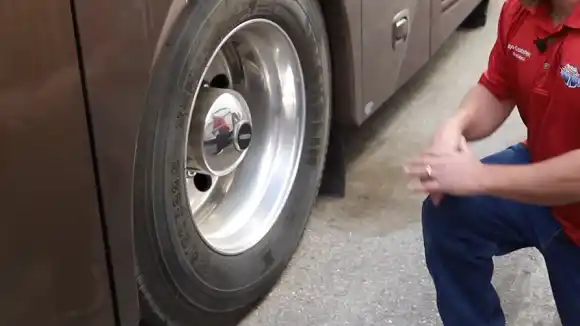
To ensure optimal performance and safety, you should regularly monitor your trailer tires and replace them after three years, even if they still appear to have sufficient tread depth, as the average lifespan of trailer tires is about five years under normal use and maintenance conditions.
It is important to note that the service life of trailer tires may vary depending on the manufacturer’s recommendations and the specific type of tire. However, statistics suggest that three years is a good rule of thumb for tire replacement.
Maximize Efficiency and Safety on the Road with Proper Trailer Tire Maintenance
You now understand the reasons behind the rapid wear and tear of trailer tires. Due to the unique characteristics of trailers, such as their weight distribution and frequent stops and starts, the tires experience uneven degradation.
Additionally, factors like overloading, underinflation, and lack of maintenance also contribute to the quick deterioration of these tires.
To mitigate this issue, it’s crucial to regularly inspect and maintain your trailer tires, ensuring proper inflation, rotation, and load distribution.
Doing so can prolong the lifespan of your trailer tires and ensure safe and efficient hauling. Remember, as the saying goes, “A stitch in time saves nine.”

